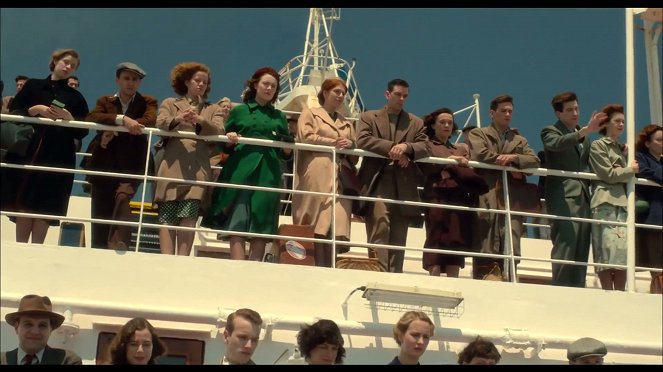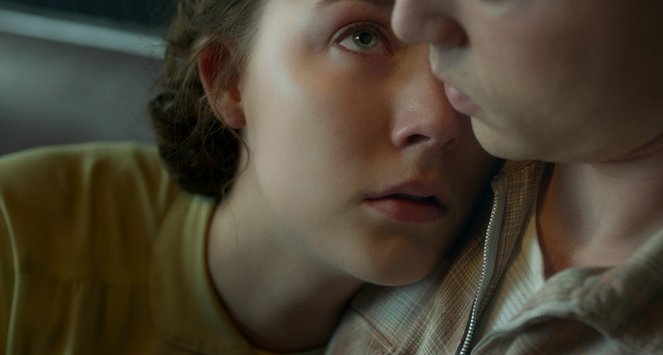Réalisation:
John CrowleyScénario:
Nick HornbyPhotographie:
Yves BélangerMusique:
Michael BrookActeurs·trices:
Saoirse Ronan, Brid Brennan, Fiona Glascott, Eileen O'Higgins, Peter Campion, Eva Birthistle, Julie Walters, Emily Bett Rickards (plus)VOD (3)
Résumés(1)
Dans les années 50, une jeune Irlandaise part à New-York en espérant y trouver du travail. Employée dans un grand magasin, elle prend parallèlement des cours de comptabilité. Elle s'éprend d'un plombier italien, qu'elle épouse en secret. De retour dans son pays d'origine à l'occasion de l'enterrement de sa soeur, elle se retrouve à l'heure des choix : quelle vie veut-elle mener ? (20th Century Fox FR)
(plus)Vidéo (14)
Critiques (9)
Belle bibliothèque rouge finement filmée, avec un contenu rare. Ou plutôt, avec un contenu qui perçoit et résout des événements de la vie du point de vue féminin - de manière simplifiée et à travers des larmes. La nomination à l'Oscar du film de l'année est compréhensible néanmoins, cela s'impose abondamment à "la terre promise".
()
An Irish movie about Irish immigrants in the middle of Brooklyn. So obviously, a movie that a lot of families could relate to. Personally, I liked Saoirse Ronan the best and I must say that the young Italian was right; Irish girls are prettier than the Italian ones. Even those in this movie have something about them and Saoirse is outright radiating beauty. The story isn’t anything extraordinary. You can pretty much guess it based on the premise. It’s not an innovative drama, but on the other hand, it’s proper filmmaking. And that’s definitely worth something.
()
Brooklyn is a story from the time when at least the United States welcomed economic migrants almost with open arms and all one had to do to pass through immigration control was to put on decent make-up and smile sweetly. But the film is a return to a bygone era, not only in its realities but also in its straightforward narrative. Compared to the book, it is more sentimental, more literal and less thematically expansive (it leaves out the manipulation of African-Americans and the hint of lesbian love). At the same time, however, it mostly retains the likably unforced development of events and more thoroughly develops the motif of two homes through its narrative structure. In the second half of the film, Eilis experiences similar situations as in the first half, except she is now much more experienced, having risen from pupil to teacher (the transformation culminates in the second scene on the boat, when she advises an inexperienced girl). Green is a constant reminder of home, to which other colours are gradually added, just as other emotions are added to the sadness in the protagonist’s face (instead of one emotion being completely replaced by another). The inability to cut ties to her homeland adds ambivalence to the protagonist’s journey toward fulfilling her dream – during the first hour, she suppresses her sadness, first through concentrated work, then by building a new home, only to be painfully reminded that her real and only home is in Ireland. Thus, unlike other immigration stories, the move to the US is not the end but the beginning of suffering. The boldest departure from the source material is the significant abridgment of the introductory part of the story. In the book, we get to know the environment and the people Eilis will have to leave behind over the course of several dozen pages. In the film, the girl announces shortly after the beginning that she is leaving for America, which she promptly does. Therefore, we don’t have the possibility to better get to know her older and more experienced sister Rose, whose legacy Eilis develops, and thus no tension arises with respect to which of the sisters deserves success and which will ultimately achieve it. Eilis can easily be accepted as a traditional romantic heroine. The film is thus less subversive than the book in relation to the conventions of idealistic narratives about the fulfilment of the American dream. However, it preserves the book’s narrative straightforwardness and its matter-of-fact, unsentimental tone, as it does not simply communicate to us in words and music what the protagonists is going through, but lets us experience it with her. 80%
()
A neat red-green bookcase with a pastel trim. If it has more layers than Šorš's sensitive hesitation over whether it leans more toward the stunted Italian bidet repairman, or to the snarled Irish Nazi from Star Wars, I've probably overlooked them, but it's because its overdosed by color, soft light, and Irish music. I'm not even mad at the movie, it's just a compilation of everything that kills me in similar dramas. The ending is a really clean slogan from the encyclopedia of clichés for beginning and ending screenwriters.
()
A film just like its main protagonist: a gray mouse carving a path between more attractive and prominent ones. And thanks to the fact that the role of Eilis is custom tailored for Saoirse Ronan, I feel her desire to make her own decisions at life's crossroads very closely. However, if the last act had taken a slightly more mature direction, I would have believed all of Brooklyn. The questions around relationships and bridges that can't be burned, either towards each other or away from each other, were painful for all of us. To wrap them up with a rich harlequin romance was, therefore, a cheap shot.
()



Annonces